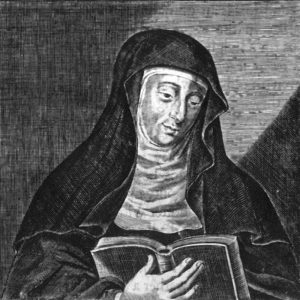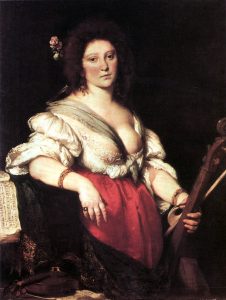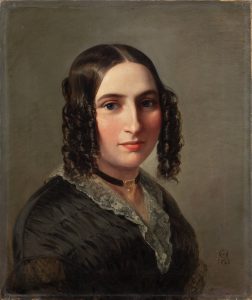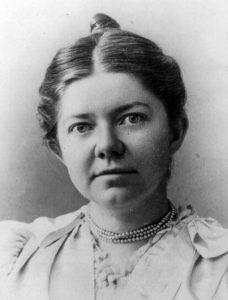In honor of Women’s History month, Classical Music Indy takes a look at four important figures from Classical Music history. Hildegard von Bingen, Barbara Strozzi, Fanny Hensel, and Amy Beach were all women who impacted future generations with their musicianship. Each of these four women had their own struggles during their time, but still made their voices heard. Read below to learn about each musician’s life and musical works!
Four Women Who Defied Expectations in Classical Music

16th century line engraving of Hildegard von Bingen, by W. Marshall.
Hildegard von Bingen (1098-1179)
Hildegard von Bingen was a writer, abbess, and composer in the Medieval Era of music. Hildegard had a life-long relationship with the Catholic Church. She became a member of the convent in the Benedictine monastery of Disibodenberg at the age of 14. She later went on to found her own convent near Bingen in 1150. During this time women were typically not allowed to sing or compose music for the church. Life in a convent, however, was different. Here, women took up the responsibility of singing the eight daily Offices and Mass.
Hildegard is a particularly special composer from this time period. Hildegard claimed to receive visions directly from God, which she then wrote down into music and prose. This reputation for having divine communication allowed her music to be spread beyond her convent, during a time and place where women were forbidden to instruct men. Not only did she find a way for her voice to be heard, but she also boasts the achievement of having more surviving chants from the Middle Ages than any other composer of the time – male or female.

“The Viola da Gamba Player,” (c. 1630-1640), by Bernardo Strozzi, believed to be of Barbara Strozzi.
Barbara Strozzi (1619-1677)
Barbara Strozzi was a vocalist and composer from the Baroque Era of music. She was born in Venice and lived there for her whole life. Unlike other women vocalists during this time, Strozzi did not perform in public. Her performances were primarily at private gatherings with a more intimate crowd. Another facet of Strozzi’s career that was unusual was her opportunity to study at the Academy of the Unisoni. Here she studied with Francesco Cavalli, one of the prominent Venetian opera composers of the time.
Barbara Strozzi composed a wealth of vocal music. She was able to publish her music, which was abnormal for women musicians to do during this period. Strozzi actually published the most cantatas (vocal pieces with a solo singer and instrumental accompaniment) than any other composer during her life. Strozzi was a master at composing works where the music changes style several times throughout the piece. This method of contrasting musical elements to convey contrasting moods was popular during Baroque Era vocal music.

Fanny Hensel, 1842, by Moritz Daniel Oppenheim.
Fanny Hensel (née Mendelssohn, 1805-1847)
Fanny Hensel was an outstanding German pianist and composer during the Romantic Era of music. Her brother was Felix Mendelssohn, one of the great composers of this time. It was said that the two siblings were both gifted in music and they often corresponded with each other to share musical ideas and critique each other’s work. Hensel’s performances were mainly held in private settings. During this era, women having careers in music was strongly discouraged. This societal belief prevented Fanny Hensel from publishing her compositions.
Hensel composed over 400 works, several of which are considered excellent pieces of music that perfectly encapsulate the style of writing that exemplifies the Romantic Era. Her masterpiece, Das Jahr, is a series of character pieces for piano based on the twelve months of the year. Hensel would regularly set up salon concerts in her own home to showcase her compositions and perform piano. These smaller gatherings were a way for her music to be heard and could be attended by up to 200 people.

Amy Beach, c. 1903.
Amy Beach (1867-1944)
Amy Beach was an American composer and pianist. She was the first female American composer to be widely recognized on a national and international scale. Beach was considered a child prodigy on piano, but was not permitted to pursue a full-time career in performance. She was also not allowed to study or teach at the top universities in the country because they excluded women. Beach took it upon herself to study composition independently by reading texts, studying scores of great composers, and playing pieces by her favorite composers.
During the turn of the 20th century, society widely believed that women lacked the capacity to composer large-scale works such as symphonies. Beach showed this belief to be incorrect by composing pieces like her Mass in Eb and Gaelic Symphony. One of the most fascinating aspects of Beach’s music is that she incorporates elements of folk music from various cultures (Irish, Scottish, Native-American, African-American) and elements of traditional German Classical music. Later in life, Beach spent a great deal of time teaching composition and being an advocate for Music Education in America.
To learn about more female innovators in music, read our blog post Voices of Change: Black Musicians as Advocates for Progress to learn about Marian Anderson, and read our post Black History Month: Musicians to Explore to learn about Angela Brown and Florence Beatrice Price. Check out our blog post A Native Voice: In Recognition of Native American Heritage Month to find info on cellist, vocalist, and composer, Dawn Avery, and learn about musical innovation from Jen Richards and Eighth Blackbird by reading our blog post: Jen Richards on Innovation at Eighth Blackbird.
This month’s blog posts are made possible by the Eloise Paul Women in Music Fund.






Leave a Reply